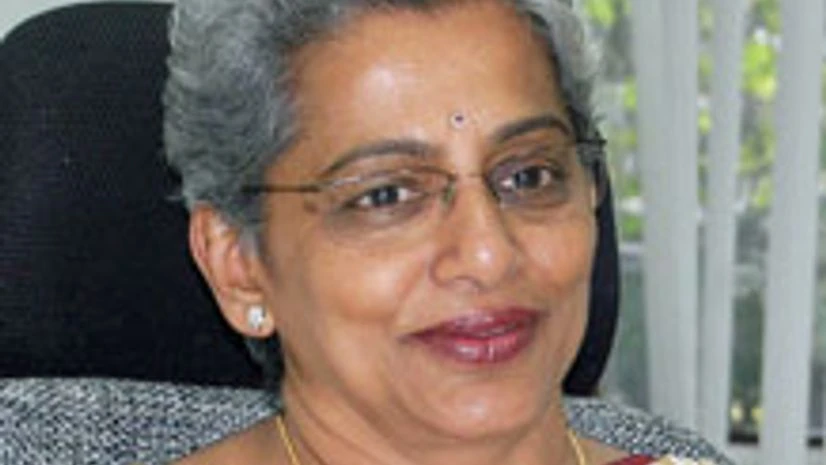There is a disturbing trend in many public sector banks – as soon as they get a new chief, their profits plummet and bad loans rise. Shubhalakshmi Panse says this won’t happen at Allahabad Bank after she retires. Panse steps down as chairperson and managing director of the Kolkata-based state-run lender at the end of this month. In an interview with Somasroy Chakraborty, she talks of the progress under her leadership and unfinished tasks. Edited excerpts:
You only had 16 months to lead Allahabad Bank. How do you assess your performance?
I had done a lot of basic study on the bank, as I knew I’d be here for only a short period. But there were a few challenges I did not envisage. The Reserve Bank of India (RBI)’s annual financial inspection was just over and they had identified around Rs 1,770 crore of non-performing assets (NPAs). These were not shown in the previous year's books and we had to make provisions. I realised NPA was a big challenge for us.
More From This Section
Technology was the other area. We had to streamline our systems and rem-ove any duplication in the processes. We decided to give our new officers three-month on-board training. Earlier, it was only for a week. I designed a one-month programme for sub-staff and a special course for assistant general managers.
Has asset quality improved in October-December? How big is the loan restructuring pipeline?
In April-June, NPA accretion was around Rs 1,600 crore; in July-September, it was Rs 1,190 crore. I am expecting it to be at the same level in October-December. Given the economic scenario, I believe it is fairly okay for a loan portfolio of Rs 134,000 crore. I expect it to stabilise, going forward. Our restructured loan portfolio is around Rs 13,000 crore.
Of these, Rs 3,000 crore is in the CDR (corporate debt restructuring) cell and the remaining Rs 10,000 crore is bilateral loan restructuring. Of the loans restructured outside CDR, Rs 6,000 crore is to power distribution companies, against which we have received bonds. Our CDR pipeline is now around Rs 1,600 crore.
Most state-run banks' profits dip when a new chief takes charge. Will the trend reverse when you retire?
I don't think Allahabad Bank's profit will fall on account of a balance sheet clea-ning after I retire. I have not been hiding any NPA. If the market is not good, if there is a mark-to-market (MTM, writing down assets to reflect current value) loss, then there might be some stress.
But profit will not fall because of hidden NPAs. Not only NPAs; I have been making Rs 20 crore of provisions every month for salary increase as well. Till date, I have made a provision of Rs 220 crore for salary increments, though negotiations are still on. Whatever money the bank will require, I have kept it aside. That is why you won’t see fantastic profit (in my last quarter).
Why is RBI conducting an audit in Allahabad Bank?
This is a thematic audit, to see if our systems are robust enough to identify NPAs. It should’ve been finished by December 31 but they are examining a lot of data and it has been extended till January 21. Ideally, I would have liked to finish this audit and take the corrective actions, if any, before I retire. We have taken care of our systems and wherever there were issues, we have plugged these. But I feel it is my moral duty to complete the whole thing before I retire.
Is there any unfinished task?
I would have liked to revamp the entire information technology structure and open a branch in Dhaka, Bangladesh. We had got all the clearances for the branch but because of the elections there, it is getting delayed. These are my unfinished agenda. Probably the next chairman will take these to a logical conclusion.
Were you cautious in lending in the current uncertain environment?
I was extremely cautious and avoided sectors that were under stress – like power and steel. We were also slow in lending to the chemical sector. Those sectors that gave us pain in the past, we totally avoided. We also reduced the ticket size of our loans. Earlier, there were instances where we took an exposure of Rs 800-1,000 crore on a company.
We reduced that. We were too much dependent on the corporate sector. We wanted to remove the concentration risk because if a big account turns bad the bank takes a big hit. On the asset side, our retail portfolio was less than 13%.
We have now increased the share of retail loans to 17.5%, and probably by year end it will touch 20%. Our loan growth in the past few quarters was driven by a combination of retail, MSME, corporate and infrastructure advances. We picked only those sectors that we thought will not trouble us in the future.
Is there a plan to raise capital in the near future?
We received Rs 400 crore from the government. The government's share in the bank has now increased to 58% from 55% earlier. We also plan to raise Rs 320 crore through a QIP (qualified institutional placement) issue. We will launch the issue either this quarter or next, depending on the market conditions. With that, by March, 2015, we should comfortably comply with the Basel III rules.

)
